Developing a generation of great leaders takes great leaders. Meet our global team.
The Problem
With workers burnt out from the pandemic, and many nearing retirement age, there will likely be an exodus of leaders during the next five years. Meanwhile, the sector is chronically understaffed and struggling to provide for basic public health services. These deficiencies disproportionately impact Black, indigenous, and people of color (BIPOC), leading to staggering health inequities.
Compounding this is the increasingly complex operating environment U.S. public health leaders work in. While public health workers tend to be technically skilled, there is a sector-wide underinvestment in the strategic skills, and especially the leadership and management competencies, required to effectively realize public health results in today’s environment. We need leaders who have skills, resources and networks to strengthen their organizations, coordinate cross-sector partnerships, advocate effectively to and for the communities they serve, in order to improve health outcomes, and ensure that everyone has the opportunity to live a healthy and dignified life.
What GHC Does
We identify diverse, high-potential, emerging U.S. public health leaders, and provide them with the leadership training, coaching, network, and resources to excel in their careers and advance health equity.
Our diverse community of leaders represents a multitude of racial/ethnic identities, geographic locations, role types and sectors, in order to foster the exchange of unique perspectives, resources, and network-sharing. We’re especially focused on recruiting individuals underrepresented in U.S. public health leadership, particularly Black, Latinx, Indigenous, and other people of color.
Participants who successfully complete our 12-month fellowship program become members of our global alumni community, which provides career-long access to a robust network, training and resources.
Sign up here to receive updates from GHC and be the first to hear about applications opening.
Eligibility
Applicants must meet the following criteria in order to be eligible for the U.S. fellowship:
- Be an emerging leader (age 21-30)
- Currently living in and authorized to work in the U.S.
- Currently employed in a U.S.-focused non-clinical public health role
- Employed at their current organization for at least 6 months at the time of application
We strongly encourage applicants who identify with communities underrepresented in U.S. public health leadership to apply, specifically Black, Hispanic, Indigenous, and other leaders of color.
Public health is a broad field and we are excited to consider applicants across sectors – including federally qualified health centers, local health departments or state agencies, government agencies, universities, community-based and non-governmental organizations, and private sector employers.
We are very interested in receiving applications from candidates working in sectors and areas that are considered understaffed but increasingly important for strengthening the U.S. health system, including: government, community based-health, health IT, data informatics and analytics, environmental health, behavioral health, and health communications.
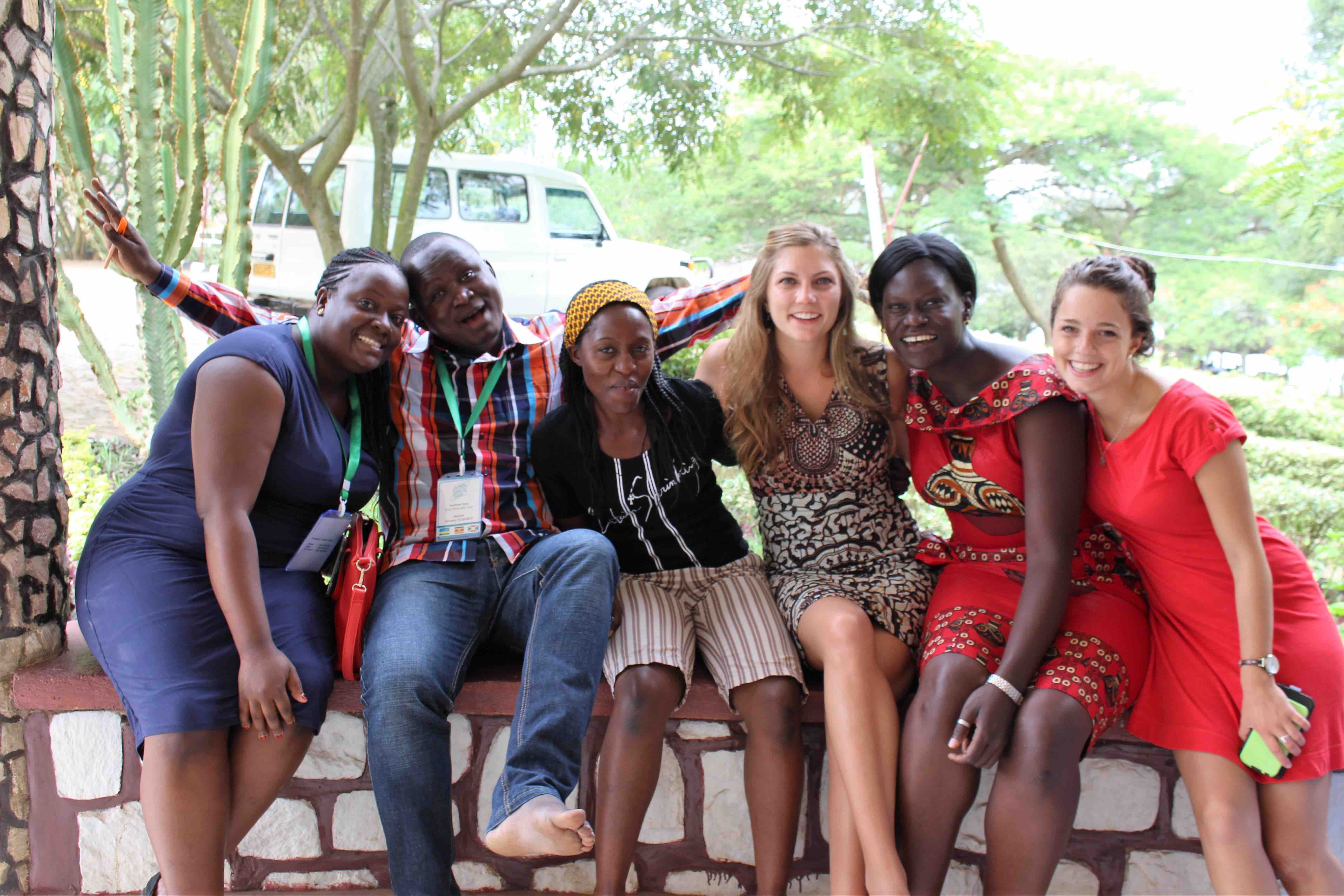
Leadership Program
Effective public health leaders need deep technical expertise, broad strategic skills, and encompassing leadership and management capabilities.
Historically, the field has focused on developing technical expertise through degree and accreditation programs. Strategic skills are being more generously incorporated into these programs; candidates are also coming from other disciplines with these experiences and skill sets. Leadership and management skills, however, continue to essentially be learned on the job, without the robust training, coaching and support offered in other areas of development.
Our 12-month program is designed to provide leaders with leadership and management training, coaching, networks, and resources to excel in their careers and advance health equity.
Our experiential model is designed to support fellows to access insights and tools they can immediately practice using in their workplaces. Learning is amplified through engagement with a diverse cohort of fellows who can share their experience and perspective to help expand fellows’ capacity for empathy and imagination. Our U.S. cohort will have multiple touchpoints with our sub-Saharan African fellows, fostering an exchange of ideas and perspectives to ensure our leaders can approach their work with a global perspective.
Fellows who complete our program receive ongoing investment and support through our robust alumni program.
In 2022, GHC has trained and supported 92 fellows across two fellowship classes. They are strengthening health systems at 25 different high-impact health organizations in Malawi, Rwanda, Uganda, and Zambia, including Partners In Health, Amref Health Africa, Ministries of Health, and more.
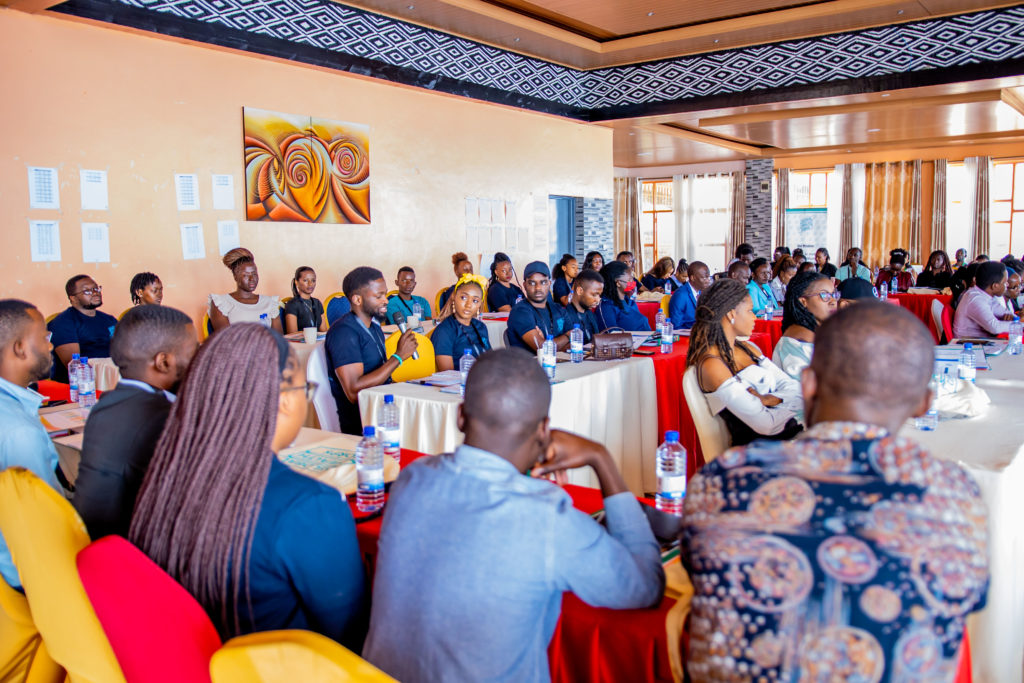
Malawi fellow Ronald Jr. Masoka addressing the 2022-2023 fellows at Training Institute in Kibuye, Rwanda.
We are proud to have worked with 44 organizations across Uganda to develop 246 young leaders since our founding in 2010. Our Ugandan community is advancing health equity across the country, from training traditional birth attendants to tackling HIV and menstruation stigma.
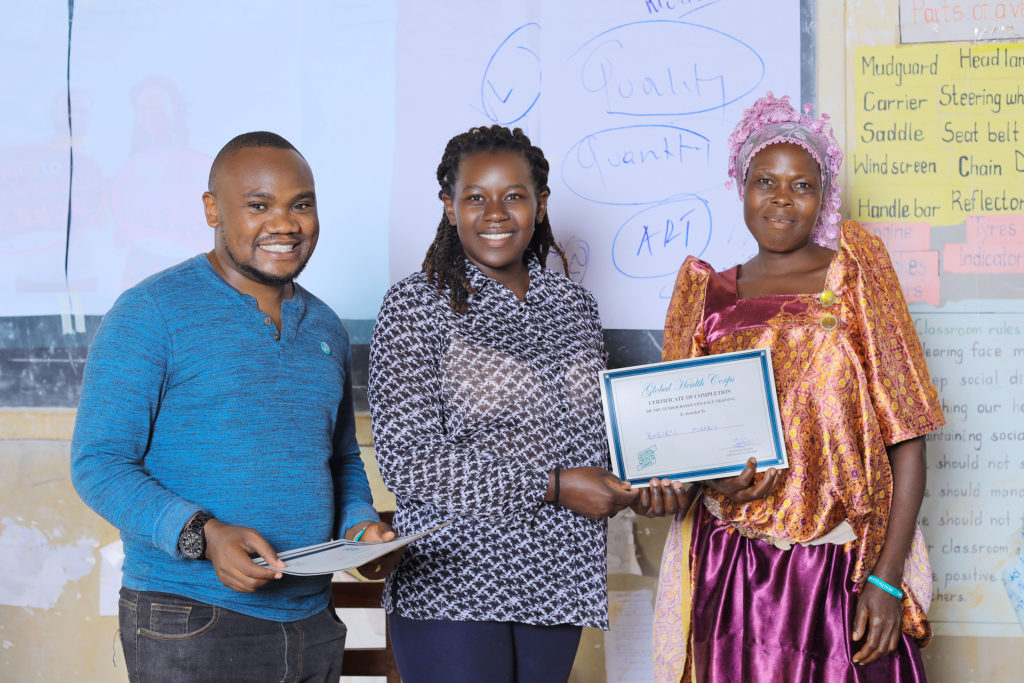
Ugandan alums Brian Ahimbisibwe and Caroline Achola issue a certificate of completion to a participant in their Gender-Based Violence Training.
Since we began working in Zambia in 2012, GHC is proud to have developed 158 leaders placed within 24 organizations across the country. Our Zambian fellows and alumni work together to advance health equity, from improving mental health service delivery to leveraging technology for health education.
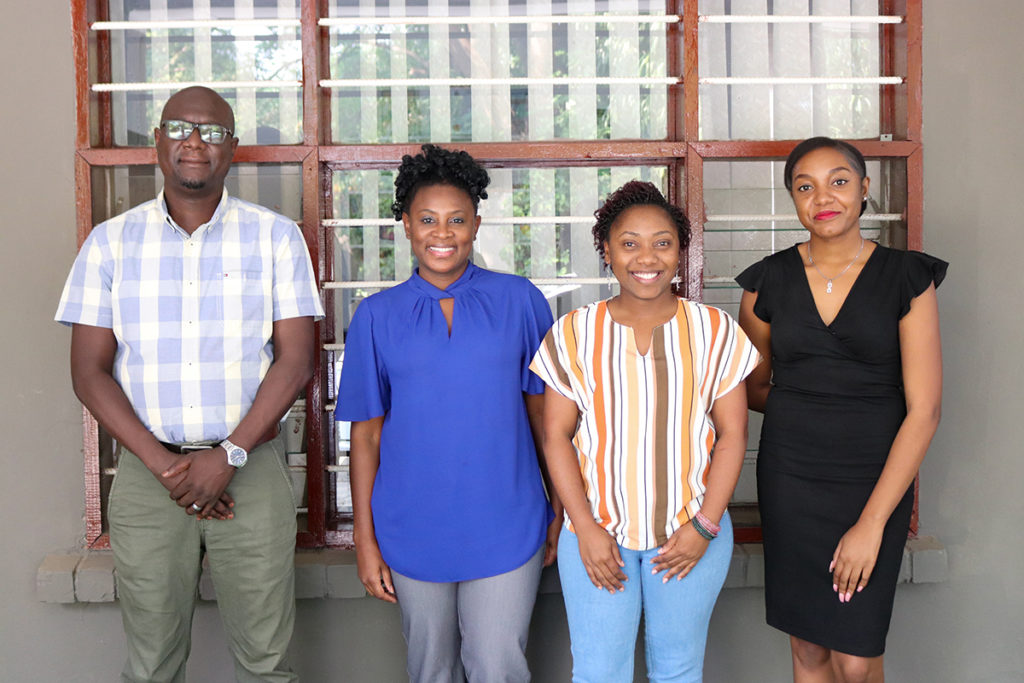
Zambia Country Director Sheila Sibajene (second from left) and Senior Program & Operations Coordinator Mweene Chibbonta (far right) with program leaders from GHC placement organization, NOWSPAR
Since 2009, we have partnered with over 25 organizations and trained nearly 200 leaders in Malawi. Our leaders share an unwavering commitment to addressing systemic issues at the intersection of health equity and access.
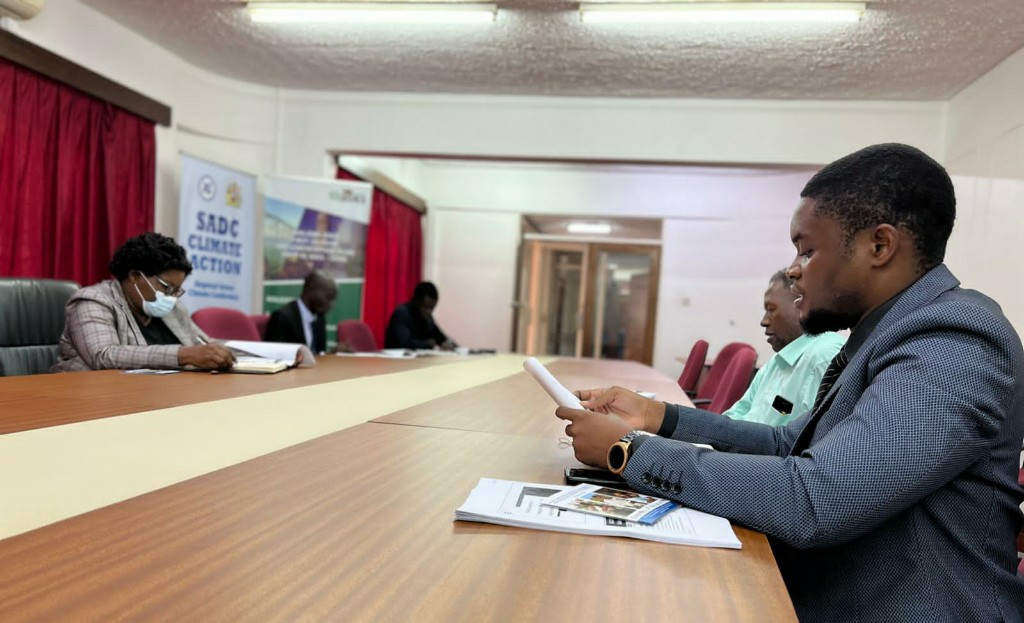
With his placement organization African Institute for Development Policy, 2021-2022 fellow Chimwemwe Chifungo presented to the Malawi Ministry of Natural Resources, Energy, and Mining. He highlighted the importance of integrating family planning and reproductive health into population, environment, and development agendas.
For the past decade, we have partnered with 25 organizations across Rwanda to develop and train 249 leaders. Our Rwandan leaders have worked on initiatives to meet urgent needs and strengthen health systems across the country, from preventing unwanted pregnancies to building healthier clinics.
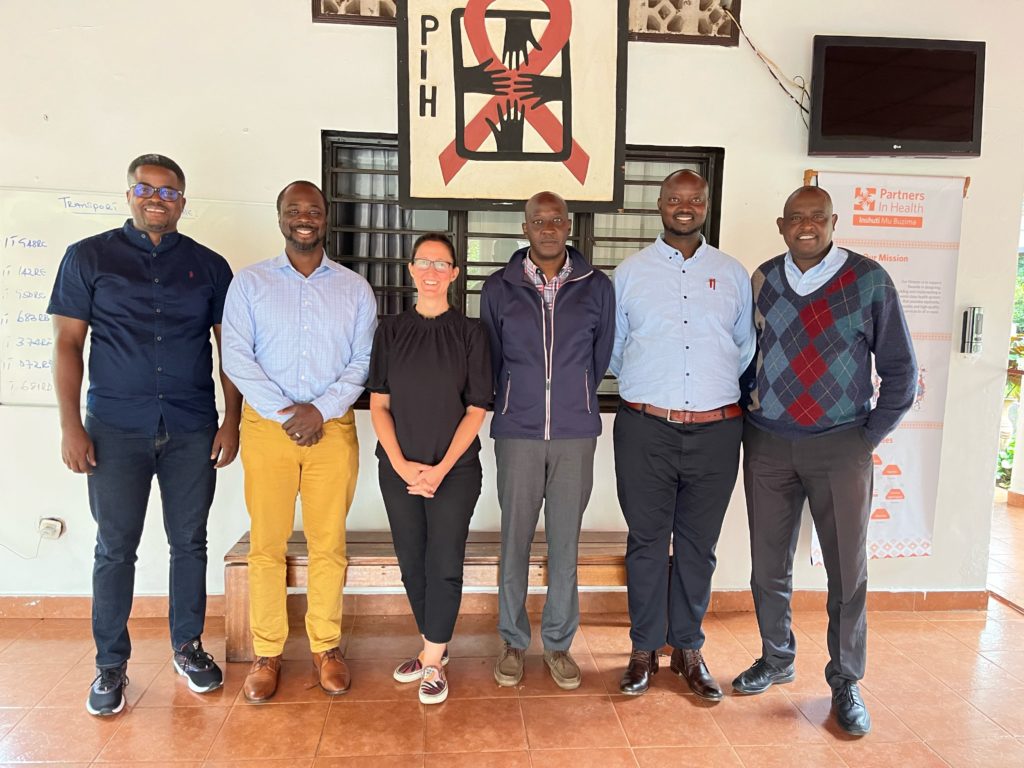
With his placement organization African Institute for Development Policy, 2021-2022 fellow Chimwemwe Chifungo presented to the Malawi Ministry of Natural Resources, Energy, and Mining. He highlighted the importance of integrating family planning and reproductive health into population, environment, and development agendas.
What GHC Does
We identify diverse, high-potential, emerging U.S. public health leaders, and provide them with the leadership training, coaching, network, and resources to excel in their careers and advance health equity.
Our diverse community of leaders represents a multitude of racial/ethnic identities, geographic locations, role types and sectors, in order to foster the exchange of unique perspectives, resources, and network-sharing. We’re especially focused on recruiting individuals underrepresented in U.S. public health leadership, particularly Black, Latinx, Indigenous, and other people of color.
Participants who successfully complete our 12-month fellowship program become members of our global alumni community, which provides career-long access to a robust network, training and resources.
Sign up here to receive updates from GHC and be the first to hear about applications opening.
Leadership Program
Effective public health leaders need deep technical expertise, broad strategic skills, and encompassing leadership and management capabilities.
Historically, the field has focused on developing technical expertise through degree and accreditation programs. Strategic skills are being more generously incorporated into these programs; candidates are also coming from other disciplines with these experiences and skill sets. Leadership and management skills, however, continue to essentially be learned on the job, without the robust training, coaching and support offered in other areas of development.
Our 12-month program is designed to provide leaders with leadership and management training, coaching, networks, and resources to excel in their careers and advance health equity.
Our experiential model is designed to support fellows to access insights and tools they can immediately practice using in their workplaces. Learning is amplified through engagement with a diverse cohort of fellows who can share their experience and perspective to help expand fellows’ capacity for empathy and imagination. Our U.S. cohort will have multiple touchpoints with our sub-Saharan African fellows, fostering an exchange of ideas and perspectives to ensure our leaders can approach their work with a global perspective.
Fellows who complete our program receive ongoing investment and support through our robust alumni program.
The U.S. fellowship includes:
- Two in-person leadership workshops
- Executive coaching
- 360 performance evaluation
- Monthly virtual learning sessions
- Speakers series
- Small group discussion/reflection
- Professional development fund
- Asynchronous resources (e.g. toolkits, essential readings lists, course recommendations)
- GHC staff coaching and support
- Alumni mentorship
- Network building (with sub-Saharan Africa cohort, US alumni, public health advisors)
Key Dates
Fellow applications open
January 25, 2023
Priority application closes
February 24, 2023
Final application closes
March 24, 2023
First virtual convening
June 21, 2023
In-person convening
September 2023
Final in-person convening; transition to alumni
May 2024
Eligibility Quiz:
Please complete this questionnaire prior to beginning an application to confirm that you meet our eligibility requirements for participation. Eligibility requirements must be met at the time of submitting an application. Please contact [email protected] with any questions regarding eligibility.
